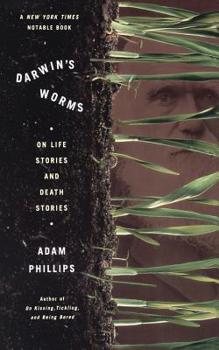Darwin's Worms: On Life Stories and Death Stories
Select Format
Select Condition 
Book Overview
Adam Phillips has been called "the psychotherapist of the floating world" and "the closest thing we have to a philosopher of happiness." His style is epigrammatic; his intelligence, electric. His new book, Darwin's Worms, uses the biographical details of Darwin's and Freud's lives to examine endings-suffering, mortality, extinction, and death. Both Freud and Darwin were interested in how destruction conserves life. They took their inspiration from...
Format:Paperback
Language:English
ISBN:0465056768
ISBN13:9780465056767
Release Date:February 2001
Publisher:Basic Books
Length:160 Pages
Weight:0.40 lbs.
Dimensions:0.4" x 5.2" x 8.0"
Customer Reviews
4 ratings
Beautifully written
Published by Thriftbooks.com User , 21 years ago
A provocatively insightful, beautiful elegy on the transience of life. Phillips turns to these two thinkers not to provide a study of their theory as much as to discover in them the workings of his own imagination (and also to illuminate the not-so-conscious underpinnings of their own thought). He is his most elegant in the Prologue and Epilogue--for these two sections alone the book is well worth the price.
a matter of life and death
Published by Thriftbooks.com User , 24 years ago
how brilliantof adam phillips to have written a book with which i totally agree.he has laid open the catch-22 of one's own very personal dance with death and it is indeed a grand achievement. to other superstitious jewish atheists like myself, here is a reason to don nobly the banner of Good Loser and to smile.
The Beauty of Ephemera
Published by Thriftbooks.com User , 24 years ago
As Adam Phillips shows in his brief and intense book, neither Darwin nor Freud saw the forest for the trees. He notes the epistemic capture of his twins, without properly crediting Heraclitus for it. He writes: "[For them] there was no longer any such a thing as a ... person with a recognizable identity." ( p. 21.) Which is only to say that, in their opinion, Socrates' I was transient.True we cannot step into the same river twice, it being transient, but a lot of dazzling Greek philosophizing happened after that of the Presocratics, Socrates' for one. Is everything in the world of common experience transient? "No," says Socrates, confident of the survival-after-death of his never-changing I. What rendered Darwin and Freud blind both to the reality of their unchanging I-dentity and to its immunity to change and to death? In my judgment their minds, already befuddled by their daillance with atheism, were further obtunded by their jejune diet of Heraclitean junk food, having by-passed the solid nourishment afforded by Plato and Aristotle. What had atheism to do with it? Simply this: the condign punishment for denying the existence of God (the Supreme I) is to evolve into one of Time's fools. This is perhaps the most ironic evolutionary event of all. Of this syndrome, Nicolas Berdyaev, the celebrated 20th century Russian philosopher wrote illuminatingly as follows: "That is the essence of the tragedy as it affects the philosopher [the thinker]. On the one hand, he is incapable of supporting, indeed, refuses to suffer the authority of religion; on the other, he tends to lose all notion of Being, and the strength it imparts, as soon as he becomes detached from religious [transcendent] experience."One cannot but sympathize with D & F for trying to salvage whatever the transient world might offer. Of this, however, I am sure: Socrates would not have settled for the ephemeral beauty of a Brazilian rain forest, or for the raptures of psychoanalytical procedures. More highly evolved than Mr. Phillips' two "masterminds," Socrates naturally selected for the real gold of I-existence over the fool's gold of the transient ego. --John Cantwell Kiley, M.D., Ph.D. (philosophy)
stories behind the stories
Published by Thriftbooks.com User , 24 years ago
As usual, Phillips' disarmingly easy prose reveals a great deal of thought about the stories behind the stories: the messages that can only be found by asking the right questions. This erudite author can point the way toward new ways of thinking about psychoanalytical themes because he calls on a wealth of knowledge and synthetical ability. Be warned, however, that the reader has to take his own psychoanalytical knowledge to the encounter and be willing to track down some of Phillips' references from time to time. The clearness of his writing hides a number of concepts that the author presumes his audience knows. Whether you agree with his conclusions or not is irrelevant, the experience is worth the effort and can make a reader clarify his own thinking.





